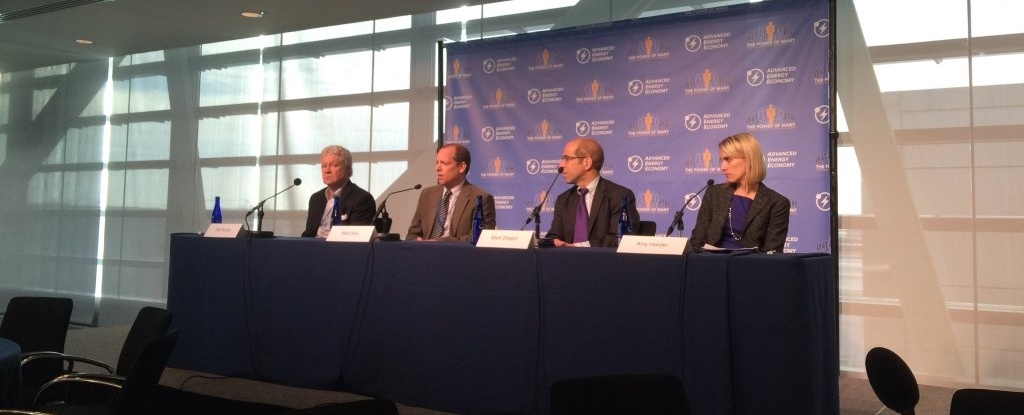This post originally appeared on the NECEC blog.

Energy Policy, Politics and the 2016 Election was the topic of an exciting panel at the annual conference of NECEC’s national partner Advanced Energy Economy this week. The panel, moderated by AEE VP of Communications Bob Keough, featured a conversation with national energy media veterans Amy Harder of the Wall Street Journal, Rod Kuckro of EnergyWire News, Matt Daily of Politico and Mark Drajem of Bloomberg News, who discussed the prospects of the Bipartisan Energy Legislation in Congress, the impact of the recent stay issued by the Supreme Court on the Clean Power Plan, energy issues in the 2016 presidential race and more.
There was widespread consensus among the reporters that the comprehensive bipartisan energy bill introduce by Senator Lisa Murkowski of Alaska and Senator Maria Cantwell of Washington filed in January 2016 had little chance of going anywhere. The bill, which would "update the nation’s power grid and oil and gas transportation systems to address major changes in the ways that power is now produced in the United States" according to the New York Times, may pass the Senate, but even if so, will likely slide into the night. The main reason these reporters gave for low hopes was that unlike ITC and PTC extender legislation in late 2015, there isn't a powerful group of constituents lobbying for the bill to give it the momentum the push it needs.
“You don't see a lot of interest by congressional leadership to get it passed. Right now the Flint water crisis has taken ahold of Congress’ attention, but Congress has proven time and gain that they don't use a crisis as a reason to pass a bill,” said the Wall Street Journal's Harder. “The greatest example of that is the BP oil spill. After the BP oil spill, Congress debated a lot of legislation but didn't pass anything. There's always going to be a senator who wants to hold it up and unless you have a powerful lobbying force, there's always going to be someone to hold it up.”
Aside from the ITC/PTC tax extenders last fall, most of the energy action in Washington has been focused on the courts and regulatory proceedings. The Supreme Court has taken up mercury regulations, demand response and the Clean Power Plan in recent months, which reporters attribute to two factors: first is the fact that the EPA is really active and pushing a lot of significant items through in an effort to act on climate change (such as the Clean Power Plan) and secondly because congress hasn’t actually taken up energy issues in so long.
“Typically, Congress has done a comprehensive energy bill every 10 years, they aren't doing that,” said EnergyWire's Rod Kuckro. “The lack of leadership in Congress has led to these issues being fought out in the courts.”
Discussing the impact of the recent Supreme Court stay on the advanced energy and the Clean Power Plan, reporter Matt Daily of Politico noted that the generational shift going on in utilities across the country right now will have more of an impact on advanced energy than the legal proceeding at this point.
“The old school is slowly giving way to people who are comfortable with new technologies and I think you'll see the new technologies starting to take hold, while we see the legal issues around the CPP shake out.”
When it comes to politics and the presidential campaign, the reporters agreed that energy hasn’t risen to a top issue with the candidates, largely because it’s not something that voters really care about. Climate, on the other hand, remains largely divisive along party lines.
“Climate will be an issue, because for Democrats it's a call to their base, but it's not going to rise to the level of a real wedge issue,” said Daily.
Asked by AEE’s Bob Keough what the clean energy industry can do to better tell their story, Kuckro noted that companies need to better tell the story of how they have helped bring the country out of economic recession.
“I don't think the nation as a whole understands the value that your industry has contributed to the recovery of this country. That story hasn’t been told very well. If you look back to the industrial revolution, we've led the world in technology development,” he said. “This industry needs to better sell to politicians that you’re not some kind of one-off industry. You're just as important as the automobile industry.”
Mark questioned whether the clean energy industry really needed much from the federal government right now. “Maybe if the feds ignore you for a few years, the market will take care of it,” he asked.
The group agreed that the exciting and important work energy companies face is in the ground in states and cities. “Work with state regulators and put together packages that work in cities and states. That's going to be the greatest way of getting it out there and changing the way we use electricity,” said Daily.